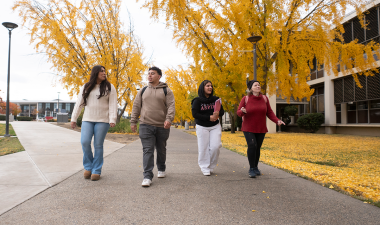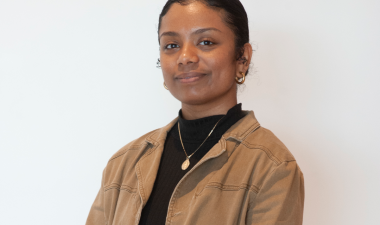A beautiful spring day, as Stanislaus State Provost Rich Ogle noted, was the perfect time to celebrate the continued awakening of the amazing work of faculty, staff and students, celebrated at the Research, Scholarship and Creative Activities Celebration.
More than 100 people gathered to hear about nine faculty projects and to see 14 posters of student research.
Since the arrival of Dean of Graduate Studies and Research Haley Ye in 2021, opportunities for studies have grown exponentially.
Stan State faculty were awarded $10.3 million for research grants in the last year alone. Additionally, more than 100 faculty and staff members produced books, book chapters or papers for publication and 13 created musical works or other works of art.
The Research, Scholarship and Creative Activities Celebration is a reminder that, “for many faculty, it’s a lifelong tradition to enrich your discipline,” President Ellen Junn said.
Ogle noted that last year’s gathering for this program was, appropriately, one of the first large in-person gatherings on campus as it repopulated from the pandemic.
“When it comes to research, scholarship and creative activity, these things are the fuel that drive us and sustain us,” Ogle said. “As we talk about what is the engine of a university education, it’s academics. It’s teaching. It’s the work of faculty, staff and students committed to creating those transformational experiences inside the classroom.”
And, in many cases, outside the classroom.
Biology students Jordan Prather, Kyle Moll Lee, Maria Merza and Bryce Kitabayashi ventured to the Stanislaus and Tuolumne rivers to collect samples and study the first evidence of microplastics contamination, a “first step toward environmental health risk assessment in Stanislaus and San Joaquin counties,” Prather said.
Plastic, which usually begins as a large item, gets into the river and is broken down into microscopic pieces by water and ultraviolet rays.
For Prather, Lee and Kitabayashi, who shared the poster of their research that was proposed by Associate Professor of Biological Sciences Ritin Bhaduri, the project was the first research they had been a part of, and it provided unexpected learning experiences.
“For me, a lot of it was about working with other people and the logistics that go into research,” Prather said. “The trick is to find where to collect data. It involves people from a lot of different areas, different departments.”
“Science takes work,” Kitabayashi said. “When I read papers, a lot of the time I look at information and wish it was more accurate. Then, you actually do science research, if you add all those parameters on, it makes it that much more difficult. You need so much more equipment, so much more funding, so much more time. Having those items supported allows you to get your work done and deliver something that makes sense.”
“What I learned is not biology,” Lee said. “To be in a laboratory, in a research project, you learn it’s not all about the research. There are so many tiny things you have to keep track of. We broke our sink, so I did some plumbing. You would not think plumbing would be a part of lab work, but here I am doing plumbing.”
Those discoveries did not dissuade any of the three who will graduate in May. All said they will continue to pursue work as biologists.
Other students developed their own research project with faculty advisers.
Edith Herrera looked into “Gendered Attitudes and Beliefs Among Latinx Youth.”
“I wanted to know if my generation — I’m also Latinx — was going to continue this tradition of gender roles and beliefs and attitudes like machismo,” said Herrera, a McNair Scholar and sociology major who will graduate in May.
She spoke with people aged 16-22 and parents and discovered “youth are resisting gender norms with their parents and questioning a lot.”
It’s causing parents to question their own beliefs. Her own parents immigrated from Mexico and while her dad is slower than her mom to change his thinking, both are ahead of relatives who visit from Mexico.
“Moving here was kind of them being rebellious, their changing gender stereotypes they grew up with,” Herrera said. “I feel like my parents took a tiny leap so we could take a giant leap to be able to challenge these attitudes.”
Fellow McNair Scholar Bethany Saint-Smith also chose a personal area of research, “Representations of Skin Tone, Colorism and Reimagining Marginality for Black Women.”
She interviewed Black women in academia.
“Having darker skin makes for experiences that are very different from someone with skin tone like mine and white-passing Black women,” Saint-Smith said. “You can’t imagine developing a conscious response to how somebody feels when they talk about their skin tone. In fact, most people don’t think about it, because they don’t have to. As Black women, we’re forced to. Whatever space we enter, we have to know how we’re going to behave, what that performance looks like, how to switch it if we need to, want to, and how to navigate those spaces.
“The idea of marginality, of telling Black women you’re in this marginalized space, takes away from your ability to be centered. If you start looking at centrality of space, taking away white supremacy and really bridging the ability for Black and white people to be centered and create their own tables of inclusion, their own philosophical understandings of themselves and culture property, autonomy. If we let them have that space, we can do really brilliant things with it and build a space that would be more inclusive for people that are like us.”
Saint-Smith has been awarded a Chancellor Fellowship for Excellence and Inclusion at UC Merced, where she plans to further her work on this project as a graduate student.
Work goes on with many projects.
Associate Professor of Chemistry Gönül Vardar-Schara, recognized along with Steven Drouin, professor in advanced studies in education and interim director of the Community Equity Research Center for their advising roles, had students involved in four different projects who presented posters.
Noella Younan, Amrit Hayer and Angelina Dauz worked on one, Younan and Isabel Gaddo on another, K. Cansu Yanik-Yidirum, Onkar Phul, Owen Roth, Areli Tlatelpa, Gerardo Soria-P and Burcan Vardar-Yel on a third and Eli Frazer worked solo with Vardar-Schara.
Other student presenters were Mary Vardeh with Ashlynn Walker (“Developing a New Teacher Retention/Aid Program in a Post-Pandemic World” under Associate Professor of Mathematics Bjorg Johannsdottir); Daisy Ramirez (“Sequential Enrollment: A Model for Expanding Access to Bachelor of Science Programs to Promote a Diverse Nursing Workforce” under RN-BSN Program Director Sherry Roper); Melissa Rubio (“Fluency vs. Literacy in Multilingual College Students in the Central Valley” under Modern Languages Lecturer Sandra García Sanborn); Heather Collins (“Ethnogeology: A Call for Interdisciplinary Studies of Indigenous Knowledge” under Assistant Professor of Anthropology Ryan Logan); Nahui Gonzalez-Millan (“Pre-Pandemic Income Status and Latina Mothers Experience of Stress and Chronicity of Economic Insecurity During the COVID-19 Pandemic” under Drouin); Seth Zaragoza and Andrea Orozco (“Sulfonic Acid Functionalized Mesoporous Organosillica Nanotubes for Biodiesel Synthesis” under Associate Professor of Chemistry Amanpreet Manchanda); Dylon Fleming (“Eos: High Energy Hybrid Neutrino Detector” under Associate Professor of Physics Wing To) and Jill Baker, Osvaldo Carranza, Samantha Castro, Joanna Cruz and Emily Podesta (“Musical Rollercoaster Ride” under Psychology Lecturer Deborah Forester).
Faculty who shared their work were Assistant Professor of Mathematics Jessica De Silva (“A Strengths-Based Approach to Undergraduate Mathematics Research”); Librarian Kevin Augustine, English Lecturer Jacqueline Hollcraft and Matthew Notary (“Embedded Librarianship and Implementation of Information Literacy in First-Year Composition”); Jake Weigel (“Community Building in the Warrior Fab Lab”); Drouin and Associate Professor of Geography Alison McNally (“CERC’s Community Equity Index Dashboard”); Professor and Director of the Interdisciplinary Studies Program Tony Perrello (“Earworms”); Advanced Studies Assistant Professor Donnieau Snyder for Suzanne Whitehead and Dianne Vargas (“Heartfelt Reflections: The Lived Experiences of Substance Use Disorder Counselors Throughout the COVID-19 Pandemic”); Associate Professor of Biological Sciences Michael Fleming (“What do the Numbers Say? Quantitative Analysis of Students Written Responses About Metabolism”); Librarian Margarita Zamora Saunders (“Keeping Design and Accessibility Top of Mind”); and English Professor Jesse Wolfe (“Two Books about Intimacy and 20th Century Literature”).



